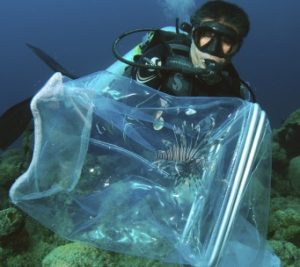November 09, 2011
By Sam Hudson
Divers capture 312 lionfish during Lower Keys Derby on Nov. 5.
 (Photo by Stuart Cove)
(Photo by Stuart Cove)
More than 50 divers collected 312 lionfish Nov. 5 during the final 2011 Lower Keys Lionfish Derby. Each derby reduces the population of the invasive species in the Florida Keys National Marine Sanctuary. The latest results brought the total number of lionfish removed for the year during three Florida Keys lionfish roundups to 1,518 lionfish.
The Lower Keys Lionfish Derby attracted 14 teams that competed for the most, largest and smallest lionfish. Top group Bottle Buddies won the 1st place $1,000 prize by capturing 110 lionfish. The team, consisting of Bob Elkins and Bob Cerkleski of Key West, also caught the derby's largest lionfish—it measured 13.54 inches and earned the team an additional $500 prize.
Team Austin Assassins earned $500 for bringing in the smallest lionfish, measuring 3.15 inches. Teammates Curtis Mueller, Harris Casey, David Price and Matt Magnum all hail from Austin, Texas.
The venomous Indo-Pacific red lionfish, whose Atlantic Ocean presence probably started in the 1980s from aquarium fish escapees, is considered an invasive species with no natural reef predators except man. Its rapidly growing populations steal space and food resources from domestic species like grouper and snapper. Researchers from the U.S. Geological Survey collected tissue samples from lionfish caught at the derby to learn more about lionfish feeding ecology and impacts. Additionally, researchers from Salisbury University and the University of Florida collected data on lionfish parasites and reproductive biology.
This year's tournament was headquartered at Stock Island's Hurricane Hole Restaurant & Marina. The derbies are hosted by the Reef Environmental Education Foundation (REEF) and the Florida Keys National Marine Sanctuary.
